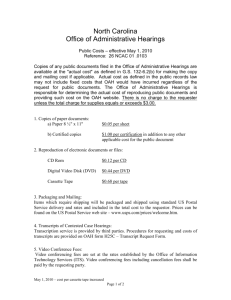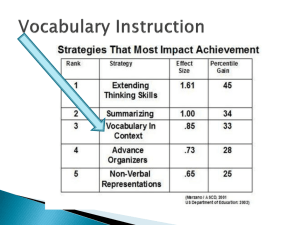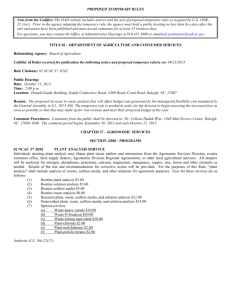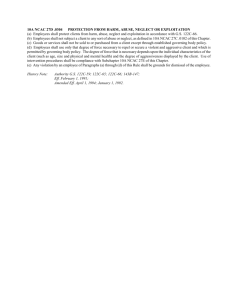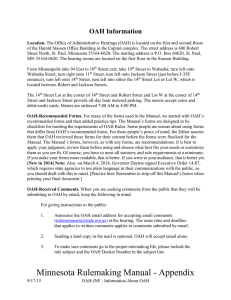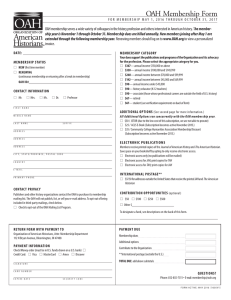Glossary of Terms Used in Rulemaking Below is a listing of terms
advertisement
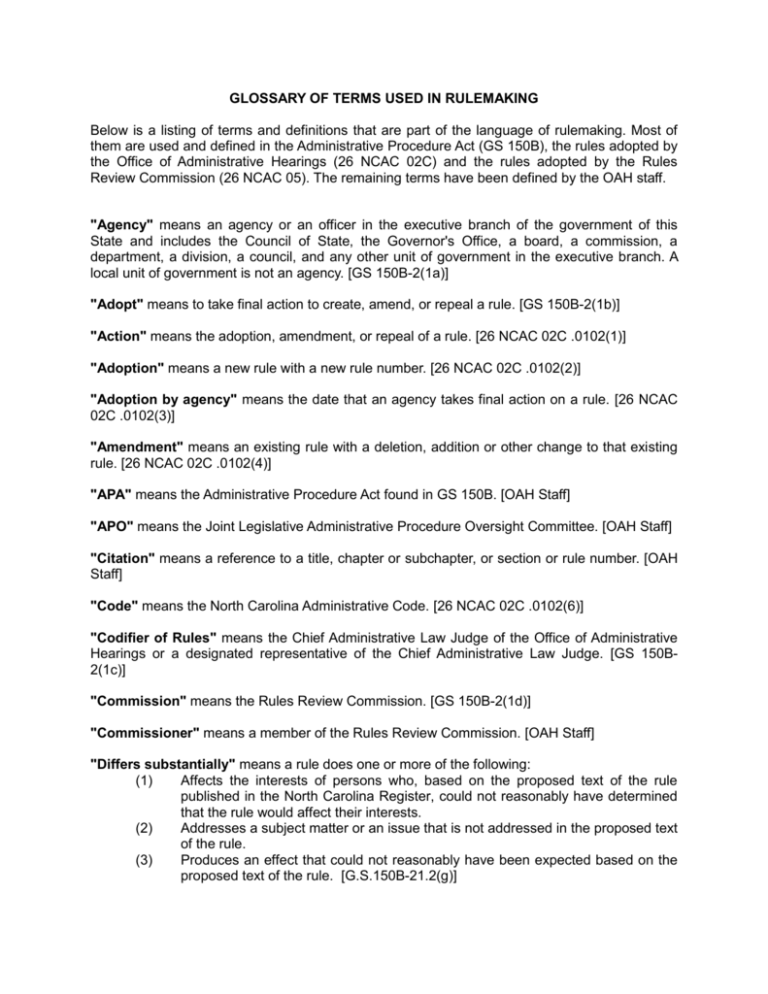
GLOSSARY OF TERMS USED IN RULEMAKING Below is a listing of terms and definitions that are part of the language of rulemaking. Most of them are used and defined in the Administrative Procedure Act (GS 150B), the rules adopted by the Office of Administrative Hearings (26 NCAC 02C) and the rules adopted by the Rules Review Commission (26 NCAC 05). The remaining terms have been defined by the OAH staff. "Agency" means an agency or an officer in the executive branch of the government of this State and includes the Council of State, the Governor's Office, a board, a commission, a department, a division, a council, and any other unit of government in the executive branch. A local unit of government is not an agency. [GS 150B-2(1a)] "Adopt" means to take final action to create, amend, or repeal a rule. [GS 150B-2(1b)] "Action" means the adoption, amendment, or repeal of a rule. [26 NCAC 02C .0102(1)] "Adoption" means a new rule with a new rule number. [26 NCAC 02C .0102(2)] "Adoption by agency" means the date that an agency takes final action on a rule. [26 NCAC 02C .0102(3)] "Amendment" means an existing rule with a deletion, addition or other change to that existing rule. [26 NCAC 02C .0102(4)] "APA" means the Administrative Procedure Act found in GS 150B. [OAH Staff] "APO" means the Joint Legislative Administrative Procedure Oversight Committee. [OAH Staff] "Citation" means a reference to a title, chapter or subchapter, or section or rule number. [OAH Staff] "Code" means the North Carolina Administrative Code. [26 NCAC 02C .0102(6)] "Codifier of Rules" means the Chief Administrative Law Judge of the Office of Administrative Hearings or a designated representative of the Chief Administrative Law Judge. [GS 150B2(1c)] "Commission" means the Rules Review Commission. [GS 150B-2(1d)] "Commissioner" means a member of the Rules Review Commission. [OAH Staff] "Differs substantially" means a rule does one or more of the following: (1) Affects the interests of persons who, based on the proposed text of the rule published in the North Carolina Register, could not reasonably have determined that the rule would affect their interests. (2) Addresses a subject matter or an issue that is not addressed in the proposed text of the rule. (3) Produces an effect that could not reasonably have been expected based on the proposed text of the rule. [G.S.150B-21.2(g)] "Effective Date" means the date a law or rule takes effect. [OAH Staff] "Electronic version" means the computerized format of a document prepared in accordance with 26 NCAC 02C .0105. "Fiscal Note" means the analysis of the impacts of a proposed rule or rule change required by GS 150B-21.4. [See below for additional terms defined by OSBM] "Form" means an original form provided by OAH; a computer generated form from the OAH website or from a CD or a diskette provided by OAH; a legible photocopy of an original OAH form; or an agency generated form identical to the OAH form. [26 NCAC 02C .0102(8)] "Gov-Ops" means the Joint Legislative Commission on Governmental Operations for reporting rules with fees pursuant to GS 12-3.1. [OAH Staff] "Introductory Statement" means information preceding each rule submitted to OAH for publication explaining what action is being taken. [OAH Staff] "NCAC" means the North Carolina Administrative Code. [OAH Staff] "NCR" means the North Carolina Register. [OAH Staff] "OAH" means the Office of Administrative Hearings. [OAH Staff] "Objection letter" means any letter or other written correspondence from the public pursuant to G.S. 150B-21.3(b2) objecting to a rule and requesting review of the rule by the General Assembly filed with the Rules Review Commission while the rule is under review by the Rules Review Commission or by 5:00pm the day after its approval by the RRC. [26 NCAC 05 .0101(2)] "Occupational licensing agency" means any board, commission, committee or other agency of the State of North Carolina which is established for the primary purpose of regulating the entry of persons into, and/or the conduct of persons within a particular profession, occupation or field of endeavor, and which is authorized to issue and revoke licenses. "Occupational licensing agency" does not include State agencies or departments which may as only a part of their regular function issue permits or licenses. [GS 150B-2(4b)] "Original" means a copy of the document marked or stamped as such. [26 NCAC 02C .0102(10)] "OSBM" means the Office of State Budget and Management. [OAH Staff] "Person" means any natural person, partnership, corporation, body politic and any unincorporated association, organization, or society which may sue or be sued under a common name. [GS 150B-2(7)] "Publication" includes publication on the OAH website or in the Register or entry into the Code. [26 NCAC 02C .0102(11)] "Register" means the North Carolina Register. [26 NCAC 02C .0102(12)] "Repeal" means the deletion of the entire text of a rule. When a rule is repealed that rule number shall not be used again. The number, rule name, and final history note shall remain in the Code permanently for publication and reference purposes. [26 NCAC 02C .0102(13)] "Review" means the statutory "Part 3. Review by Commission" at G.S. 150B-21.8 and following including the RRC action as set out in G.S. 150B-21.10. [26 NCAC 05 .0101(3)] "Rewritten rules" mean rules that have been revised in an attempt to satisfy an objection by the Commission. [26 NCAC 05 .0101(4)] "RRC" means the Rules Review Commission. [OAH Staff] "Rule" means any agency regulation, standard, or statement of general applicability that implements or interprets an enactment of the General Assembly or Congress or a regulation adopted by a federal agency or that describes the procedure or practice requirements of an agency. The term includes the establishment of a fee and the amendment or repeal of a prior rule. The term does not include the following: a. Statements concerning only the internal management of an agency or group of agencies within the same principal office or department enumerated in G.S. 143A-11 or 143B-6, including policies and procedures manuals, if the statement does not directly or substantially affect the procedural or substantive rights or duties of a person not employed by the agency or group of agencies. b. Budgets and budget policies and procedures issued by the Director of the Budget, by the head of a department, as defined by G.S. 143A-2 or G.S. 143B-3, by an occupational licensing board, as defined by G.S. 93B-1, or by the State Board of Elections. c. Nonbinding interpretive statements within the delegated authority of an agency that merely define, interpret, or explain the meaning of a statute or rule. d. A form, the contents or substantive requirements of which are prescribed by rule or statute. e. Statements of agency policy made in the context of another proceeding, including: 1. Declaratory rulings under G.S. 150B-4. 2. Orders establishing or fixing rates or tariffs. f. Requirements, communicated to the public by the use of signs or symbols, concerning the use of public roads, bridges, ferries, buildings, or facilities. g. Statements that set forth criteria or guidelines to be used by the staff of an agency in performing audits, investigations, or inspections; in settling financial disputes or negotiating financial arrangements; or in the defense, prosecution, or settlement of cases. h. Scientific, architectural, or engineering standards, forms, or procedures, including design criteria and construction standards used to construct or maintain highways, bridges, or ferries. i. Job classification standards, job qualifications, and salaries established for positions under the jurisdiction of the State Personnel Commission. j. Establishment of the interest rate that applies to tax assessments under G.S. 105241.21 and the variable component of the excise tax on motor fuel under G.S. 105449.80. k. The State Medical Facilities Plan, if the Plan has been prepared with public notice and hearing as provided in G.S. 131E-176(25), reviewed by the Commission for compliance with G.S. 131E-176(25), and approved by the Governor. [GS 150B-2(8a)] "Rulemaking Coordinator" means the person(s) designated by each agency to oversee the agency's rule-making functions. [GS 150B-21] "Rulemaking Agency" means the agency given the authority by the General Assembly to adopt a rule. [OAH Staff] "Rulemaking authority" means the statute or other law granting an agency the power to adopt a rule. [OAH Staff] "Staff opinion" or "staff recommendation" means the written or verbal position of a commission counsel as to whether the Commission should approve or object to a rule along with the reasons for doing so. [OAH Staff] "Technical Changes" mean the changes made by an agency to reply to a request from the Commission or its staff as set out in G.S. 150B-21.10. Technical changes shall not result in a substantive change in the meaning, interpretation, or application of a rule and include the following categories of changes: (a) Correcting errors of a general nature including: (i) obvious typographical errors, misspellings, punctuation, and grammatical errors; (ii) preferred English or legal usage; (iii) errors in complying with OAH or, perhaps, statutory requirements that are not substantive errors; and (iv) proof of compliance with the legally required process. (b) Correcting errors that would appear to be substantive changes except that they do not change the intended or accepted meaning, interpretation or application of the rule including: (i) changing "should" or "will" to "shall" or "must;" (ii) clarifying the use of "approved;" (iii) clarifying or correcting the use of "and," "or" or "and/or;" (iv) clarifying or deleting commonly used adjectives or adverbs such as "thoroughly," "clearly," "adequately," "appropriate," and "substantial;" and (v) inserting substantive contents of a rule's catchline (or title) into the rule itself. (c) Requesting agencies to rewrite a rule, paragraph, or portions of a rule to more clearly express the intent of the agency when the meaning and application of the rule is known and understood. (d) Acting on agencies' requests on behalf of citizens or agency staff to clarify the intent, requirements, or prohibition of a rule that would not result in a change in the rule's enforcement. (e) Deleting or rewriting portions of rules that are not necessary rather than raising objections. [26 NCAC 05 .0101(5)] OSBM GLOSSARY OF TERMS USED IN PREPARING FISCAL NOTES "Baseline" means the best assessment of how the world would look absent the proposed permanent rule change. Baseline is the counterfactual used in fiscal note analysis. It includes current statutes and rules, but excludes existing, uncodified policies. "Discounting" means the method by which a progressively lower value is placed on benefits and costs the further they occur in the future. Discounting expresses benefits and costs occurring in different periods in terms of their present value. For example, to discount $100 that occurs next year and express it in terms of its value today is to perform the following calculation: $100/(1+discount rate). Using a discount rate of 7%, the value would be about 93.5. Today's value of $100 occurring two years from now is: $100/(1+discount rate)2, which at a 7% discount rate would be about $87. "Discount rate" means the rate used to discount future benefits and costs to their present value so they can be summed up and compared. OSBM requires that a discount rate of 7% be used in fiscal note analysis. "Fiscal note" means the analysis of the impacts of a proposed rule change. The fiscal note translates rule language into policy implementation and helps identify the distributional effects and realistic consequences of a proposed rule change. "Net Present Value" or "NPV" means sum of the present value of costs and/or benefits that occur in different time periods. Net Present Value is a standard method for using the time value of money by discounting to bring costs and benefits to a common time period so that they can be comparable. "Opportunity cost" means the value of the best foregone alternative (next best choice) as a result of taking a specific action. "Risk analysis" means the analysis of the uncertainties involved in fiscal note analysis by discussing the different events that might change the estimated costs and benefits of a rule change. "Rule change" means a package of individual permanent rules that are new or proposed for amendment, which form a new policy and which the agency plans to publish together. "Significant rule change" means a proposed rule change that may: - have a significant effect on the economy, state, or local government funds; - create an inconsistency with an action taken or planned by another agency; or - raise novel policy issues. "Small business" means a business entity, including its affiliates, that: - is independently owned and operated and - employs fewer than 500 full-time employees or has gross annual sales of less than $6 million. "Substantial economic impact" means an aggregate financial impact (costs plus benefits) on all parties affected of $3 million or more in a 12-month period.
